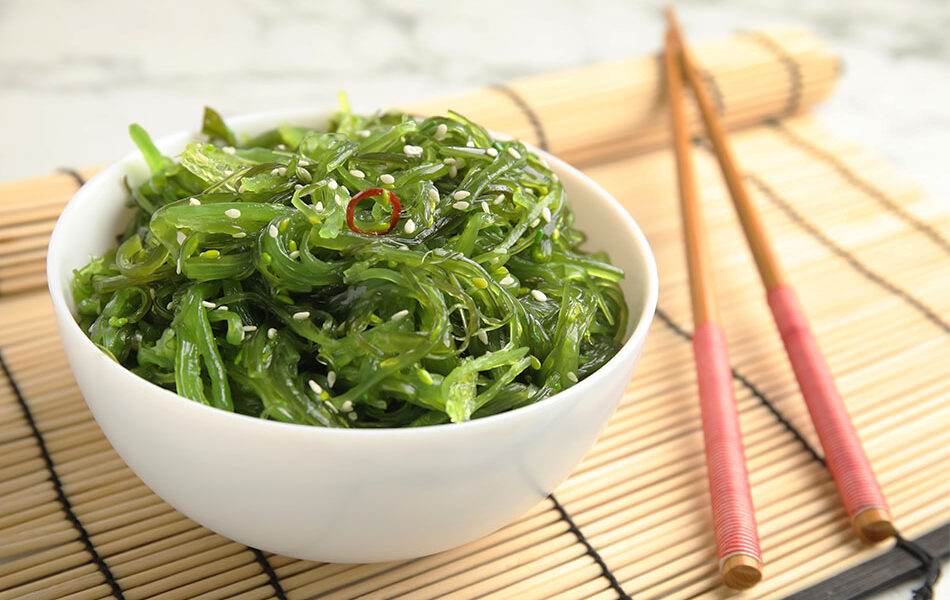Is Seaweed Salad Healthy? 5 Nutrition and Health Benefits
Seaweed salad is a popular dish, particularly in Chinese, Korean, and Japanese restaurants, and is feted as a superfood. In this article, we will explore the potential health benefits of seaweed salad and its nutrition.

Seaweed is a sea vegetable popularly used in salads, soups, and smoothies – one of the most common uses of it is in sushi. Like other vegetables, seaweed is rich in vitamins and minerals and is a natural source of dietary fiber.
The edible sea vegetable comes in various colors, such as red, green, and brown. Some common types of seaweed used in salads include wakame, arame, nori, kemp, Irish moss, sea palm, and blue-green algae, which all have different tastes and nutrition profiles. However, wakame is the most popular seaweed to use in a salad.
This article will share everything you need to know about seaweed salad, including the health benefits, nutritional profile, and how to prepare a simple wakame seaweed recipe at home.
Is Wakame Seaweed Salad Healthy?
Yes, wakame seaweed salad is healthy because it is an excellent source of essential vitamins, minerals, and antioxidants that are beneficial for overall health. However, it contains a high amount of sodium and should be consumed in moderation.
5 Health Benefits of Seaweed Salad
Wakame salad is a nutritional powerhouse with various health benefits. Here are 5 of the top advantages of adding this nutrient-dense dish to your diet:
#1 Contains essential nutrients
Seaweed is a good source of macronutrients such as protein, carbs, and healthy fats with a low-calorie profile. It contains all 9 essential amino acids and is a good option for vegans.
It also contains essential vitamins and minerals such as vitamins A, B12, C, and E, iron, calcium, and iodine, which are necessary for maintaining good health.
Wakame salad increases your fiber intake, which helps to lower blood pressure and cholesterol and reduce the risk of heart disease.
#2 Supports thyroid function
Seaweed salad is the best source of iodine, which is vital for thyroid function. Seaweed can absorb iodine from the sea in amounts that the body cannot synthesize on its own.
Iodine intake is necessary for the production of thyroid hormones. Its deficiency can cause metabolic issues, struggle with weight fatigue, and can result in hypothyroidism or goiter, which is a swelling on the neck.
Iodine deficiency affects about 2 billion people worldwide and is a common cause of preventable brain damage.
#3 Rich in antioxidants
Japanese seaweed contains powerful antioxidants such as beta-carotene and vitamins C and E that help prevent oxidative stress and inflammation caused by free radicals.
The antioxidants reduce the risk of diabetes, heart disease, and cancer.
Wakame seaweed contains fucoxanthin, a carotenoid that protects cell membranes from oxidative stress. The antioxidant provides 13.5 times more protection than vitamin E.
#4 Supports weight loss
Seaweed salad is low in calories and is a good source of dietary fiber, which helps you feel fuller for longer by reducing your appetite.
It also contains some anti-obesity properties because of its fucoxanthin content and fucoidans that inhibit lipid absorption.
#5 Supports gut health
Seaweed has high amounts of prebiotics which help feed beneficial gut bacteria, promoting better digestion and overall gut health. Prebiotics are a type of dietary fiber metabolized by gut bacteria, which produce short-chain fatty acids that provide energy to the cells.
An imbalance of the gut bacteria causes poor digestive health and can lead to obesity and diseases such as diabetes and irritable bowel syndrome.
Nutrition Facts of Seaweed
Nutritional value per 100g
| Calories/ Nutrients (per 100g) | Amount |
| Calories (kcal) | 70 |
| Net Carbs (g) | 6 |
| Fiber (g) | 5 |
| Sugar (g) | 6 |
| Fats (total) | 2.5 |
| Protein (g) | 1 |
| Sodium (mg) | 820 |
Source: https://fdc.nal.usda.gov/fdc-app.html#/food-details/1780827/nutrients
Low in calories
Seaweed salad contains fewer than 100kcal in a 100g serving. The salad is highly nutritious and contains a good amount of fiber which is beneficial for weight loss.
Low in proteins
Seaweed salad has 1g of protein per 100g serving, which is relatively low. Generally, you need 0.8–1g of protein per 1kg of body weight daily. The good thing is that it has high-quality protein with all the essential amino acids.
Low in fats
Wakame salad only contains 2.5g of fat per 100g serving, which is excellent for heart health.
Moderate amount of carbs and sugars
Wakame salad has a moderate sugar content of only 6g per 100g and is packed with soluble fiber, which provides 20% of the daily value. Fiber boosts satiety, helps control blood glucose levels, and improves digestive health.
Healthy Wakame Seaweed Salad Recipe
Dried wakame seaweed has a distinct and strong flavor and texture. It is commonly used in soups and salads. Make this delicious and healthy wakame salad recipe in just 10 minutes. Serve with sushi rolls or miso soup.
Ingredients
- 2oz dried wakame seaweed
- 6 tbsp low sodium soy sauce
- 2 tbsp rice vinegar
- ½ tsp red pepper flakes
- 1 tbsp ginger, grated
- 1 tsp garlic, grated
- 1 tbsp sesame oil, toasted
- 1 cup cucumber slices (optional)
- 2 tbsp sesame or pumpkin seeds, toasted
Directions
- Soak the dried seaweed in a medium-sized bowl filled with cold water. Set aside for 10 minutes to rehydrate.
- Meanwhile, prepare the dressing. In a mixing bowl, mix soy sauce, grated ginger and garlic, sesame oil, rice vinegar, and red pepper flakes. Set aside.
- Strain the rehydrated seaweed from the water using a strainer and rinse thoroughly. Squeeze to remove moisture.
- Add the seaweed, cucumber slices, and sesame or pumpkin seeds to the dressing bowl. Toss to coat properly. Then, cover and place in the refrigerator for about 30 minutes to 1 hour.
- Garnish with extra sesame seeds when serving.
Good nutrition is a critical pillar of a healthy lifestyle. We would recommend checking several nutrition apps that contain educational health content along with tools such as customized meal plans, beginner workouts, and calorie trackers, which can come in handy in reaching weight loss goals.
But how do you know which one is the right one for you? Click here to check out our comprehensive review of the 11 best nutrition apps that provide thousands of healthy recipes and help build healthy habits and support your weight loss journey.
FAQs
Seaweed is the common name for thousands of species of sea vegetables. Wakame is a kelp species, an edible seaweed commonly used to make wakame seaweed salad. It is often available in dried or refrigerated forms.
Eating seaweed salad is good for weight loss because it is low in calories and contains fiber which helps to keep you fuller for longer. It also has fucoxanthin which increases metabolism.
However, it should be consumed in moderation and combined with other healthy foods as part of a balanced diet.
Seaweed salad is not fattening, as it is low in calories and fats. Wakame salad is very nutritious and contains essential vitamins and minerals such as vitamin A, calcium, and iodine.
However, it is important to note that some seaweed salads can be high in sodium, so it is best to check the label before purchasing.
A Word From a Nutritionist
Seaweed is a natural source of vitamins and minerals, including iodine, folate, magnesium, and iron. It is also high in fiber, helping to keep your digestive system running smoothly.
Eating seaweed salad may help reduce cholesterol levels and help with weight loss. However, some premade seaweed salads may also contain added sugars, salt, high-fructose corn syrup, and food coloring, which have no nutritional value.
Therefore, it is important to read nutrition labels carefully and choose seaweed salads with natural ingredients.
Seaweed may absorb heavy metals such as lead, mercury, or cadmium, which may be toxic even in small amounts. It is possible for heavy metals to accumulate when you consume them regularly. You can eat seaweed salad in moderate amounts as a healthy addition to a balanced diet.
Conclusion
The Japanese seaweed salad is a nutritious starter dish that is low in calories and packed with fiber and micronutrients such as iodine. It is also low in fats, contains moderate carbs and sugars, and provides minimal but high-quality protein for people on a plant-based diet.
The most commonly used seaweed in salads is wakame. It is sold in grocery stores as either dried or raw wakame seaweed. Make a wakame seaweed salad recipe at home to be in control of the ingredients and make it more nutritious using sesame oil and its seeds.
Consuming too much seaweed may affect health because it has high concentrations of sodium content and may have heavy metals.
To enjoy the goodness of seaweed and its potential health benefits, such as improved thyroid function and digestive health, eat seaweed salad in moderation as part of a healthy diet.

















































 Select your language:
Select your language: 







